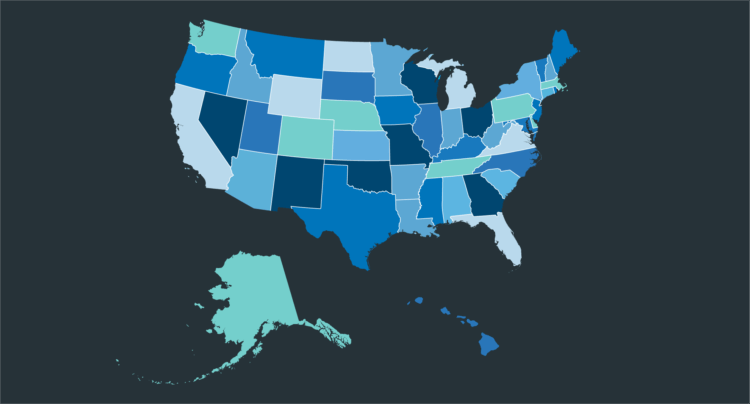As coronavirus continues to rapidly spread, stay-at-home orders are being issued in the United States. These orders close all “non-essential” businesses in an attempt to eliminate avenues of viral transmission. But are lawyers considered essential workers?
Most states are following the recommendations of the US federal Cybersecurity and Infrastructure Security Agency (CISA) in identifying what counts as the critical infrastructure sectors and the essential workers needed to maintain the services and functions across America. Access to lawyers and legal services is not considered essential by CISA, even though financial services are.
However, several states have taken their own approach on whether law firms provide essential or non-essential services. Being an essential business means that your physical locations can remain open and that employees may travel to and from the office. Working remotely is still recommended for essential businesses, but it may not be required.
Are lawyers essential services?
If you are based out of the US, look to the chart below to see if your state has deemed lawyers as essential services. Note: This chart covers only states for which a stay-at-home order or similar has been issued.
Last updated: April 6, 2020
| State | Date Effective | Legal: Essential / Nonessential | Language |
| Alabama | April 4 at 5 p.m. | Essential | “Professional Services, including legal services, accounting services, insurance services, real estate services (including appraisal and title services);” |
| Alaska | March 22 | Essential* | *”Professional services, such as legal or accounting services, when necessary to assist in compliance with legally mandated activities” |
| Arizona | March 31 at 5 p.m. | Essential | “Professional services, such as legal services, accounting services, insurance services, personal hygiene services (including barbershops and salons) with additional sanitization precautions as recommended for businesses by the Arizona Department of Health Services and real estate services (including appraisal and title services).” |
| California | March 19 | Essential* | *”when necessary to assist in compliance with legally mandated activities and critical sector services” |
| Connecticut | March 23 at 8 p.m. | Essential | |
| Delaware | March 24 at 8 a.m. | Essential | |
| District of Columbia | March 25, 2020, at 10 pm, through April 24, 2020. | Essential | “Professional Services, including legal, insurance, notary public, tax preparation and accounting services, but only when necessary to assist in compliance with legally mandated activities, Essential Businesses or Essential Governmental Functions;” |
| Florida | 12:01 a.m. on April 3 | Essential (by reference to a list published by Miami-Dade County, emergency order 07-20) | “Professional services, such as legal or accounting services, when necessary to assist in compliance with legally mandated activities; “ |
| Georgia | April 3 | Essential | “…as well as entities that provide legal services…” |
| Hawaii | March 25 at 12:01 a.m. | Essential | “Professional services, such as legal services, accounting services, insurance services, real estate services (including appraisal and title services)” |
| Idaho | March 25 | Essential | “Professional services, such as legal or accounting services, when necessary to assist in compliance with legally mandated activities” |
| Illinois | March 21 at 5 p.m. | Essential | “Professional services” but legal is not specifically identified. |
| Indiana | March 24 at 11:59 p.m. | Essential | “Professional services, such as legal services, accounting services, insurance services, and real estate services (including appraisal and title services).” |
| Kansas | March 30 at 12:01 a.m. | Essential | “Preform legal services” |
| Kentucky | March 26 at 8 p.m. | Essential | “Professional services, such as legal services, accounting services, insurance services, real estate services (including appraisal and title services). Professional services firms must implement telecommuting and remote work to the fullest extent possible, and should only use in-person interaction to support Minimum Basic Operations or where telecommuting is impossible.” |
| Louisiana | March 23 at 5 p.m. | Non-essential | |
| Maine | April 2 at 12:01 a.m. | Essential | “legal, business, professional, environmental permitting and insurance services;” |
| Maryland | March 30 at 8 p.m. | Non-essential | |
| Massachusetts | March 24 at 12 p.m. | Essential* | *”Professional services (such as legal and accounting services) and payroll and employee benefit services, when necessary to assist in compliance with legally mandated activities and critical sector services or where failure to provide such services during the time of the order would result in significant prejudice” |
| Michigan | March 24 at 12:01 a.m. | Non-essential* | *Sec. 7(a)(10) does include an exemption to the stay at home order “To attend legal proceedings or hearings for essential or emergency purposes as ordered by a court.” |
| Minnesota | March 27 at 11:59 p.m. | Essential | Legal services. This category is limited to workers who are necessary to provide essential legal services. Essential legal services include:
i. Advice and representation needed to aid the delivery of all critical government services. ii. Advice and representation required to ensure the immediate and critical health, safety, and liberties of Minnesotans, including but not limited to, end-of-life planning, immigration, essential services to elders and persons with disabilities, child supports, child-protection and domestic abuse matters, protection of personal financial resources necessary to meet basic needs, prosecution or defense in ongoing criminal matters, or all matters in which individuals are held in custody pending a legal proceeding, and proceedings held in the district or appellate courts during the effective period of this order. iii. Advice and representation related to the continuation of the Critical Sectors identified in this Executive Order, including ensuring compliance with this Executive Order, previous Executive Orders, and all applicable laws, rules, and regulations applying to Critical Sectors. iv. Supporting housing and shelter-related efforts, including loan applications, loan processing, seeking temporary relief from residential and commercial loan or lease provisions, retention of gas, electric, or water utility services, and seeking temporary relief from residential evictions or foreclosures, or other actions intended to keep people in their homes. |
| Missouri | April 6 at 12:01 a.m. | Non-essential | |
| Montana | March 28 at 12:01 a.m. | Essential | “Professional services, such as legal services, accounting services, insurance services, information technology services, real estate services (including appraisal and title services);” |
| Nevada | April 1 | Essential | “Professional or technical services including – Legal” (Update: Nevada has begun Phase 2 of reopening) |
| New Hampshire | March 27 at 11:59 p.m. | Essential | “Professional services (such as legal and accounting services) and payroll and employee benefit services, when necessary to assist in compliance with legally mandated activities and critical sector services or where failure to provide such services during the time of the order would result in significant prejudice” (Update: Businesses have started to reopen in New Hampshire) |
| New Jersey | March 21 at 9 p.m. | Non-essential | |
| New Mexico | March 24 at 8 a.m. | Essential* | *”Professional services, such as legal or accounting services, but only where necessary to assist in compliance with legally mandated activities;” |
| New York | March 22 at 8 p.m. | Non-essential* | *Solo firms may be exempt. “Any business that only has a single occupant/employee (i.e. gas station) has been deemed exempt and need not submit a request to be designated as an essential business.” |
| North Carolina | March 30 at 5 p.m. | Essential | “Professional services, such as legal services, accounting services, insurance services, professional engineering and architectural services, land surveying services, real estate services (including brokerage, appraisal and title services) and tax preparation services.” |
| Ohio | March 23 at 11:59 pm. | Essential | “Professional services, such as legal services, accounting services, insurance services, real estate services (including appraisal and title services)” |
| Oklahoma | March 25 | Essential | “NAICS 541 Professional, Scientific, and Technical Services” |
| Oregon | March 23 | Not Applicable | |
| Pennsylvania | March 23 at 8 p.m. | Non-essential | |
| Puerto Rico | March 15 at 6 p.m. | Non-essential | |
| Rhode Island | March 28 | Non-essential | |
| Tennessee | March 31 at 11:59 p.m. | Essential | “Professional Services. This includes, but is not limited to: legal services, accounting services, msurance services, or real estate services (including appraisal and title services); “ |
| Texas | April 2 at 12:01 a.m. | Non-essential | |
| Vermont | March 25 at 5 p.m. | Non-essential | |
| Washington | March 23 | Essential* | *”Professional services, such as legal or accounting and tax preparation services, when necessary to assist in compliance with legally mandated activities and critical sector services” |
| West Virginia | March 24 at 8 p.m. | Essential | “Professional services, such as legal services, accounting services, insurance services, real estate services (including appraisal and title services).” |
| Wisconsin | March 24 at 8 a.m. | Essential | “Professional services, such as legal or accounting services, insurance services, real estate services (including appraisal, home inspection, and title services). These services shall, to the greatest extent possible, use technology to avoid meeting in person, including virtual meetings, teleconference, and remote work (i.e., work from home). “ |
To answer the question of whether lawyers are considered essential services— here’s a brief summary. In total, 42 states have enacted stay-at-home orders so far. Of those states, lawyers are not considered essential workers in 12 states. And, for several states on the list, lawyers are only considered essential services for specific circumstances.
What should you do as a law firm?
You may like these posts
If a stay at home order has been issued, and law firms are essential businesses in your state
In this case, we still strongly recommend working remotely if you can to keep your clients, employees, and families safe. More and more states are issuing such orders, so if you’re still technically required to remain open, we recommend treating this as a bit of extra time to transition your firm to remote operations.
Our guide to working remotely as a lawyer has the information you need to help your firm transition to remote work.
If a stay at home order has been issued, and legal services are not considered an essential service in your state
Here, you may need to act quickly. Do not violate a stay-at-home order, but collect essential equipment you’ll need from your office if you are able (your computer, including your keyboard and mouse, and any essential files) so that you can prepare to transition your office to a virtual one from home.
We recommend seeking out guidance on how this order impacts your ethical obligations to clients as soon as possible—especially if you’re in a position where you can’t transition your practice online quickly.
You should also inform your clients that your firm has been impacted by the stay-at-home order and inform them what changes to expect in services. Even if you haven’t figured what those changes will be yet, letting your clients know that you’re aware of the stay at home order, are seeking out guidance, and will update them shortly on the next steps will provide clients with peace of mind and allow you to focus on making appropriate transitions for your law firm business.
If your state doesn’t appear on this chart
We recommend preparing to work remotely as soon as possible whether law firms are classified as an essential business in your state, and whether your state has issued a stay-at-home order, or not. With the current trend being towards asking more and more people to stay at home, being prepared is the prudent approach for your law firm, your business, and your clients.
There are plenty of resources available to help your law firm work from home. However, this shouldn’t be overwhelming. Your work-from-home setup doesn’t need to be perfect out of the gate—focus on ensuring you have access to case details, knowing how your clients will contact you for legal advice, and knowing how lawyers and staff will collaborate, and improve things in small ways from there.
As a legal professional, it’s pertinent to keep things above board. If you’re unsure of how to legally or ethically handle a challenge resulting from a stay-at-home order (for example, you’re not an essential service, but an in-person signature is needed in a timely manner), seek out as much guidance as possible. Think carefully through the process you’ll use to get around this. Be clear on your thinking about why you believe this approach made the most sense under the law should you be asked to justify this at a later time (for example, if you witness signings via video and courier documents).
Impact of COVID-19 on the Legal Profession
The legal industry is certainly not immune to COVID-19, and some sectors like human rights law have suffered due to courts being closed. The courts and legislatures also had to adapt to virtual hearing and Zoom sessions. There have also been interesting business disruptions here as well. For example, demand for contract lawyers in corporate legal departments has seen a steady increase. Also, employment law and personal injuries law are seeing more business coming their way.
Update on Law Firms and Businesses
According to The “Legal Services Global Market Report 2021: COVID-19 Impact and Recovery to 2030” report, “The global legal services market is expected to grow from $713. 66 billion in 2020 to $908. 17 billion in 2025 at a compound annual growth rate (CAGR) of 5%.”
COVID-19 has certainly pushed law firms to reinvent their business models. Going by trends, it seems that the legal industry is also undergoing a digital transformation. The initial shift like working remotely, video conferencing, and even implementing a digital content marketing strategy helped law firm businesses to sustain during this pandemic. With the basic setup of remote work in place, from the technology standpoint, law firms will likely move towards things like cybersecurity, privacy, online networking, and so on that will help them be fully prepared for the future.
With the vaccines rolling out in phases in the United States, it’s encouraging law firms to get back to business as normal. However, the role of technology in law firms shouldn’t be underestimated and those who can adapt will fare better in the post-pandemic world.
Note: This post is provided for informational purposes only. It does not constitute legal, business, or accounting advice. If you are unsure or concerned about how a stay-at-home order might affect your law firm, contact your local or state authorities for clarification. The information in this article applies only to US practices.
We published this blog post in March 2020. Last updated: .
Posted in: Business







